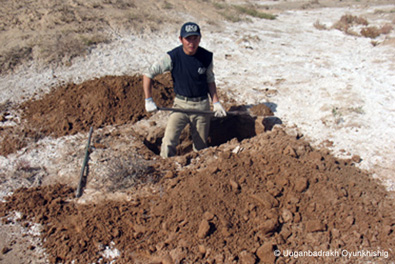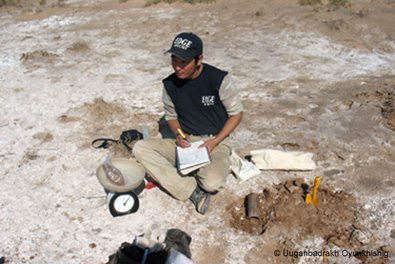Our Long-eared jerboa EDGE Fellow Uuganbadrakh has just sent us details of his hibernation study in Mongolia.
This illegal mining is near the habitat of the long-eared jerboa. There are fewer people mining now than there were and currently there are 10 local and a few more other province people mining in the area. First when people found out about the gold, there were more than 300 people and more than 100 cars. Due to mining gold, there was lot of garbage and glass from vodka bottles. Some people searching for gold used a blowing instrument that is made by hand, while other people use a metal finder. The best metal finder is around $4000-5000 compared to handmade blowing instruments with a price of $100-200. People with any money use metal finders while other people with less money use blowing instruments. When a lot of gold was discovered, most people earn more than $500 during a week. But most people don’t collect their garbage and vodka glass and don’t fill in the hole they created by digging for gold. Due to this action, there is a lot of pollution of nature. When it is windy, the soil is blown into the air. In other words this action is causing increased desertification which greatly affects Gobi desert mammal and vegetation diversity.
In this picture I am doing listening exercises in English. I used to do different English exercises, namely listening, grammar and reading. In my opinion an Ecologist must be able to be flexible and do things everywhere e.g. in a tent, car, outside and so on. I use time every day to arrange data that I collected during the day time. I also write about research procedure everyday. It helps me for writing my report and analysis. I hope to read about my research well. So I am trying to read German, English and Russian scientific papers. So far I can read English and a little Russian. My friend will help me to read the German scientific paper, without reading foreign scientific papers, I can’t write a good report.
This is a picture of me cooking lunch. During my research I ate different food with goat meat. There are a lot of goats in the south province of Mongolia. Most families that live in the Gobi desert eat goat meat and rely on the production of milk in summer. In Gobi desert the average family has more that 100 goats. Most families milk a goat in summer and milk a domestic camel, while families that live in the north part milk a cow.
In this picture I am repairing the motor of my motorcycle. The most important thing to help my research is this motorcycle. I need this motorcycle for all aspects of research and to take petrol, food and spare parts from Suam center. My motorcycle is cheap and fragile. But I can repair it and I like it. In Gobi desert most families have a motorcycle and usually ride them in the summer time. But they ride camel during winter because motorcycle is broken easily in winter and unreliable. Maybe, due to increasing motorcycle in Gobi desert, Gobi desert soil, vegetation and animals are affected negatively. In other word technical development is affecting nomadic life and wildlife negatively.
Camels have been the transport of Gobi desert people for a long time. Camels can tolerate many days without water and can go a long way. Camel wool is largely produced by local people. Now camel uses are decreasing in Mongolia. If I have a possible situation to do research by camel, I use camel. But I haven’t this situation, because to do my research I have to go with my assistant student and cannot do this with a camel.
These pictures I am digging a hole for soil research in a place where there is a lot of salt. I dug 8 holes for soil moisture and structure. Most Gobi desert small mammals rest into hole from the harsh light of the sun, making soil an important factor for small mammals. Some soil is very hard. To collect sample of soil research I dig for more than 2 hours in such soil. To study long-eared jerboa well I am trying to study all aspects of its ecology.






